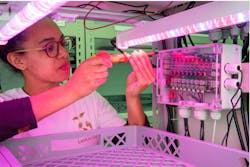Amid all the coronavirus-induced factory closures and slowdowns, one sector of the lighting industry that could be getting busier is horticultural lighting, if one small vertical farm in the UK serves as an example.
LettUs Grow, a five-year-old aquaponics grower and systems provider in Bristol, England, said it is expediting the construction of two new indoor areas on its urban farm in order to grow greens for a local food charity.
Related article: LumiGrow supplies LED fixtures to Lettuce Work foundation greenhouses
While it is not clear how large the new sections are or what their output will be, LettUs Grow is confident that it will complete the smaller of the two this month, and will have the other ready by June via “fast-tracking” the project.
“When we founded LettUs Grow, we wanted to enable anyone, anywhere in the world, to grow fresh produce near its point of consumption,” said the aptly named Jack Farmer, LettUs Grow's chief scientific officer and co-founder. “That mission has hardly ever felt as urgent as it does today. We knew we had to get involved and help in any way we could.”
Related article: Grocer uses LED lighting for store-grown produce
LettUs Grow uses LED lights and its own software called Ostara to monitor and control indoor growing. The aquaponic system props up the plants through a cloth under which the roots dangle in a mist that delivers nutrients. The LettUs Grow system can also utilize natural sunlight.
“Because most of the farm’s operations are automated, they can be run with only one person on site at any given time to allow social distancing of key workers and minimizing strain on an already stretched farm labour force,” the company said in a blog. “The food is also produced in a high care environment with few people coming into contact with it. Once up and running, the farms will be able to provide a consistent, predictable, and climate-resilient food supply to the local community all year round.”
With supply chains challenged around the world in the coronavirus pandemic, vertical farming could help alleviate potential shortages that could face countries like Britain, which imports about half of its food.
Related article: LED-centric controlled environment agriculture grabs attention, but misunderstandings endure
LettUs is providing produce to FareShare South West, a food charity that supplies about a million meals a week, and which works to minimize food waste.
LettUs' partners include the University of Bristol and Exeter University, among others.
MARK HALPER is a contributing editor for LEDs Magazine, and an energy, technology, and business journalist ([email protected]).

Mark Halper | Contributing Editor, LEDs Magazine, and Business/Energy/Technology Journalist
Mark Halper is a freelance business, technology, and science journalist who covers everything from media moguls to subatomic particles. Halper has written from locations around the world for TIME Magazine, Fortune, Forbes, the New York Times, the Financial Times, the Guardian, CBS, Wired, and many others. A US citizen living in Britain, he cut his journalism teeth cutting and pasting copy for an English-language daily newspaper in Mexico City. Halper has a BA in history from Cornell University.





